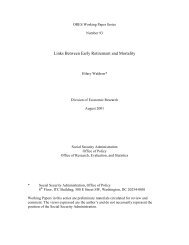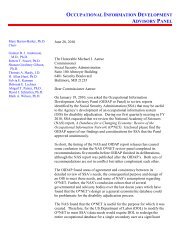not necessarily the largest gains and losses as a shareof income. 17 For example, average per capita familyincome among winners in the last wave of boomers isprojected to increase by about $5,800 for those withthe highest incomes, but by only about $800 for thosewith the lowest incomes. In comparison, average percapita family income among losers in the last waveof boomers is projected to decline by about $8,000for those with the highest incomes, but by only about$700 for those with the lowest incomes.What is Driving the Outcomes?Retirement incomes may increase under the U.K.scenario for several reasons. First, some workers mayincrease their DC contributions or earn above averagereturns on their DC retirement accounts, boostingtheir wealth relative to what they would accrue in DBplans. Second, some workers increase accruals in DBaccounts because they become vested when plans arefrozen. 18 Third, some workers whose DB plans arefrozen or who never acquire DB coverage may delayretirement and work longer because DC pensions,unlike DB pensions, do not encourage early retirement(Butrica and others 2006). Indeed, we find thatwinners are projected to have higher per capita familyearnings and slightly higher <strong>Social</strong> <strong>Security</strong> benefitsunder the U.K. scenario than under the baselinebecause of delayed retirement (Table 10).Overall, winners among first- and second-waveboomers experience increases in income from bothDB pensions and DC retirement accounts. In contrast,winners among third- and last-wave boomers experiencelosses in their DB pensions and increases in theirDC retirement accounts, with income losses in DBpensions being much smaller than income gains in DCretirement accounts.For those whose family incomes decline under theU.K. scenario, the reduction is driven almost totallyby a reduction in DB benefits. Losers experience muchlarger DB pension losses under the U.K. scenario thanwinners, but have very modest increases in incomefrom retirement account balances, compared withwinners. Losers, compared with winners, also havemuch more retirement wealth under the baseline andthus have much more to lose from a change in pensioncoverage. Their average per capita family DB pensionsrange from 1.4 to 2.5 times higher than those ofTable 10.Mean family income per person at age 67 for winners and losers, by income source (in thousands of 2007dollars)Income sourceFirstboomers(1946–1950)BaselineSecondboomers(1951–1955)Thirdboomers(1956–1960)Lastboomers(1961–1965)Difference between baseline and U.K. scenariosFirstboomers(1946–1950)Secondboomers(1951–1955)Thirdboomers(1956–1960)Lastboomers(1961–1965)WinnersIncome from assets 8.6 7.9 7.9 7.3 0.0 0.0 -0.1 -0.1Earnings 19.4 14.1 11.8 13.3 0.5 0.5 0.6 1.3SSI payments 0.0 0.0 0.0 0.0 0.0 0.0 0.0 0.0Imputed rental income 3.7 3.5 3.2 2.9 0.0 0.0 0.0 0.0<strong>Social</strong> <strong>Security</strong> benefits 14.4 14.4 13.9 13.7 0.0 0.0 0.1 0.1DB pension benefits 8.3 4.9 4.1 2.9 1.1 0.5 -0.1 -0.6Retirement accounts 9.4 9.1 9.7 9.5 0.4 0.8 1.3 2.1Total income 63.9 53.8 50.6 49.5 2.1 1.8 1.8 2.8LosersIncome from assets 7.6 8.0 8.4 9.4 0.0 0.0 0.0 -0.1Earnings 14.8 11.0 10.7 11.3 0.0 -0.1 -0.1 -0.1SSI payments 0.0 0.0 0.0 0.0 0.0 0.0 0.0 0.0Imputed rental income 3.7 3.5 3.4 3.6 0.0 0.0 0.0 0.0<strong>Social</strong> <strong>Security</strong> benefits 15.4 15.8 15.3 15.3 0.0 0.0 0.0 0.0DB pension benefits 11.6 10.2 8.4 7.2 -2.6 -3.8 -4.3 -4.3Retirement accounts 11.3 11.8 12.1 12.1 0.1 0.2 0.3 0.2Total income 64.4 60.3 58.3 58.9 -2.6 -3.7 -4.2 -4.2SOURCE: Authors' computations of MINT5 (see text for details).NOTE: Projections exclude individuals with family wealth in the top 5 percent of the distribution. Winners and losers are defined as having atleast a $10 change in income between the baseline and U.K. scenarios.18 <strong>Social</strong> <strong>Security</strong> Bulletin • Vol. 69 • No. 3 • 2009
winners, but they are also projected to have average percapita family DC retirement accounts that are 1.2 to1.3 times higher than those of winners. For all boomersprojected to lose income, the increase in DC retirementaccounts offsets less than 6 percent of the decline inDB pension benefits. This huge ratio of DB benefitlosses to DC benefit gains could occur for a variety ofreasons, including the loss of high-accruing years inDB plans, low participation or contribution rates in thenew DC retirement accounts, or lower than averageinvestment returns on retirement account assets. 19ConclusionsIn recent years, the United States has seen a significantshift away from DB pension plans to DC plans. Thisshift may accelerate rapidly as more large companies,even those with financially solvent plans, freeze theirDB plans and replace them with new or enhancedDC plans. A dramatic shift away from DB plans, ashas happened among private-sector DB plans in theUnited Kingdom, would produce both losers and winnersamong future boomer retirees. On balance, therewould be more losers than winners and averagefamily incomes would decline. The decline in familyincome is expected to be much larger for last-waveboomers born from 1961 to 1965 than for first-waveboomers born from 1946 to 1950, because last-waveboomers are more likely to have their DB pensionsfrozen with relatively little job tenure. We projectthat 26 percent of last-wave boomers would havelower family incomes at age 67, and 10 percent ofthem would experience at least a 5 percent decline.Although retirement incomes would increase for somefamilies under the alternative pension scenario, only11 percent of the last-wave boomers would see theirincomes increase, and only 3 percent would experiencea gain of 5 percent or more.Demographic groups most likely to have pensionsunder the baseline scenario are projected to be thosemost affected by the accelerated freezing of DB plans,namely non-Hispanic whites, college graduates, thosewith many years of work experience, and those inthe highest lifetime earnings and retirement incomequintiles. Because the groups most likely to have DBplans have the most income at risk but also the largestpotential gains from substituting DB pensions withadditional DC wealth, they are projected to experienceboth the largest losses and the largest gains from thepension transition. For example, average per capitafamily income among losers in the last wave of boomersis projected to decline by $8,000 for those with thehighest incomes, compared with only $700 for thosewith the lowest incomes. Also, average per capita familyincome among winners in the last wave of boomersis projected to increase by $5,800 for those with thehighest incomes, but by only $800 for those with thelowest incomes.Last-wave boomers are more likely than theirpredecessors to be high school dropouts, minority,and unmarried—characteristics that are associatedwith low earnings during working years and economicvulnerability in retirement. But these groups are lesslikely to have pensions in any form and therefore aremuch less affected by the shift from DB to DC plans.It is likely, however, that a future with fewer DB planswill generate a new class of economically vulnerableretirees among formerly better-off retirees who wererelying on their DB pension income but now, througheither bad luck or poor planning, will end up withinsufficient resources in retirement.The net decline in retirement income amongboomer cohorts that results from substituting ongoingDB plans with frozen DB plans combined withimproved DC plans is to some degree a transitoryphenomenon. If people are to participate in DB andDC plans at different times during their workingcareers, the worst scenario for them is to hold a DBplan early in their career and a DC plan late in theircareer. When workers switch from DB to DC plans inmidcareer, they lose the high-accrual years in their DBplans and have fewer years to accumulate DC wealth.Compared with retirement outcomes under this scenario,most workers would be better off participatingin either a DB or DC plan during their <strong>entire</strong> career.More than any other birth cohort, the boomer cohortswill experience the transition from DB to DC plans inmidcareer and, as our simulations show, on averagesuffer declines in their projected retirement incomes.Generation-Xers and those who come later may farebetter depending on participation rates, contributionrates, and market returns.The build-up of retirement assets is a complexprocess that varies with earnings, family changes, jobchanges, health status, individual choices, and fluctuationsin housing and stock prices, among other factors.Policymakers need to know the impact of significantshifts in pension provisions on retirement well-beingso that they can assess the alternative policy options of<strong>Social</strong> <strong>Security</strong> Bulletin • Vol. 69 • No. 3 • 2009 19
- Page 1 and 2: Social SecuritySocial SecurityBulle
- Page 3: Social SecurityBulletin Vol. 69, No
- Page 6 and 7: Perspectives77 An Empirical Study o
- Page 8 and 9: Selected Abbreviations—continuedM
- Page 10: within the next few years (Aglira 2
- Page 14 and 15: coverage varies significantly by ra
- Page 16 and 17: non-Hispanic white, and college edu
- Page 18 and 19: same groups (Table 6). For the last
- Page 20 and 21: from DB to DC pensions is accelerat
- Page 22 and 23: Table 8.Percent of individuals who
- Page 26 and 27: shoring-up DB plans before those pl
- Page 28 and 29: Table B-1.Percent change in mean pe
- Page 30 and 31: Table B-3.Percent of individuals wh
- Page 32 and 33: ReferencesAaronson, Stephanie, and
- Page 35 and 36: Social Security Administration’s
- Page 37: Chart 1.Historical expansion of Soc
- Page 40 and 41: self-employment information for the
- Page 42 and 43: (Cronin 1985). The final earnings r
- Page 44 and 45: prior to 1950, first year of earnin
- Page 46 and 47: average indexed monthly earnings (A
- Page 48 and 49: 13For an explanation of how the sel
- Page 50 and 51: Kopczuk, Emmanuel Saez, and Jae Son
- Page 53 and 54: Occupations of SSI Recipients Who W
- Page 55 and 56: on the differences between the occu
- Page 57 and 58: prediction models. Table A-1 lists
- Page 59 and 60: Occupational Distributions of theEm
- Page 61 and 62: similar, only 4 percent of the popu
- Page 63 and 64: Table 5.Estimated occupational dist
- Page 65 and 66: Table 7.Predicted Herfindahl-Hirsch
- Page 67 and 68: Table 9.Estimated occupational dist
- Page 69 and 70: Table 11.Average annual wages of wo
- Page 71 and 72: Table A-2.Means and standard errors
- Page 73 and 74: Table A-3.Coefficients and standard
- Page 75 and 76:
Table A-3.Coefficients and standard
- Page 77 and 78:
Table A-3.Coefficients and standard
- Page 79 and 80:
management, professional, and relat
- Page 81:
Stapleton, David C., Nanette Goodma
- Page 84 and 85:
Selected Abbreviations—continuedO
- Page 86 and 87:
The 1983 Amendments to the Social S
- Page 88 and 89:
Chart 1.Proportion of new claimants
- Page 90 and 91:
Table 4.The evolution of the ARF an
- Page 92 and 93:
for the test of equality of means b
- Page 94 and 95:
Table 8.Average monthly Social Secu
- Page 96 and 97:
in the chart, especially for men, t
- Page 98 and 99:
6This is a very important character
- Page 100 and 101:
Benítez-Silva, Hugo, Berna Demiral
- Page 103 and 104:
OASDI and SSI Snapshot andSSI Month
- Page 105 and 106:
Monthly Statistical Snapshot, Augus
- Page 107 and 108:
Table 2.Recipients, by eligibility
- Page 109 and 110:
SSI Federally Administered Payments
- Page 111 and 112:
Table 7.Average monthly payment, by
- Page 113:
Awards of SSI Federally Administere
- Page 116 and 117:
Copyright—Authors are responsible
- Page 119 and 120:
Program Highlights, 2009Old-Age, Su








